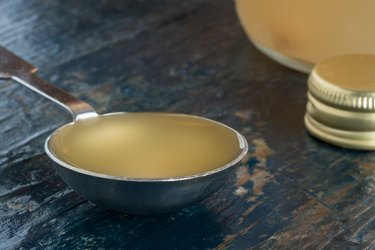
Urinary tract infections — also called UTIs — commonly develop when bacteria enter the urethra and infect the urinary tract, according to the Centers for Disease Control and Prevention (CDC). When symptoms arise, many people turn to home remedies like apple cider vinegar for a UTI.
Although apple cider vinegar, or ACV, might help prevent a UTI, using this kitchen staple while you have an ongoing infection could cause your symptoms to worsen. If you suspect you have a UTI, the CDC advises seeing your doctor for a proper diagnosis and an antibiotic prescription.
Video of the Day
Video of the Day
Tip
Home remedies like apple cider vinegar for a UTI may help with prevention. However, using ACV for a UTI likely won't clear up the infection, and prescription antibiotics will be needed.
Drinking ACV for a UTI
Most UTIs typically come about when E. coli bacteria from the colon area invade part of your urinary tract, such as your urethra or bladder, according to the Washington University School of Medicine in St. Louis. Symptoms of such an infection may include discolored or odorous urine, a burning or tingling sensation during urination, a frequent urge to void and abdominal pain or rectal pressure.
Urinary tract infections affect women more frequently than men, particularly those who are sexually active. They are more likely to occur if you need to use catheters or have an irregularly structured urinary tract.
Drinking apple cider vinegar daily could aid your urinary tract in preserving a slightly acidic environment. This discourages the growth of UTI-causing bacteria. However, once your body succumbs to an infection, you should probably not attempt to use apple cider vinegar. Once in your urinary tract, the bacteria attach to the tissue lining your bladder and urethra, which leaves the tissue inflamed and raw.
As an acidic liquid, vinegar could increase the acidity of your urine. Passing more acidic urine may exacerbate the inflamed tissue, which could result in a more severe burning sensation during voiding. In fact, even a healthy bladder may be irritated by apple cider vinegar, according to the Cleveland Clinic. Too much ACV can also irritate the lining of the throat or erode tooth enamel.
Use ACV for Prevention
Never try to treat a UTI by drinking or bathing in apple cider vinegar. Although you should avoid consuming apple cider vinegar for a UTI once you have the infection, it may be an option for preventing another UTI down the road. Talk to your primary care physician if you wish to use home remedies like apple cider vinegar for UTI prevention.
Other prevention strategies include voiding regularly to prevent bacteria accumulation in your urine, wiping from front to back, using cotton-lined panties, urinating after sexual relations and drinking six to eight cups of water daily.
In some cases, home remedies may relieve symptoms. However, don't expect them to eliminate the infection, which typically requires antibiotics, according to the American College of Obstetrics and Gynecologists (ACOG). The type, dosage and length of your antibiotic course will depend on the type of bacteria causing the infection as well as your medical history.
Read more: What You Should Know About Azo Pills
Seek Care Right Away
If you suspect you have a UTI, see your doctor as soon as possible for a proper diagnosis. To diagnose the infection, you may need to provide a urine sample to be tested for the presence of white and red blood cells and bacteria, the ACOG explains.
Failure to seek prompt diagnosis and treatment from a physician may allow the bacteria to progress to your kidneys. At that point, you could develop multiple serious complications, including a kidney infection or sepsis, according to the Mayo Clinic. Sepsis is a potentially life-threatening blood infection that typically requires hospitalization and intravenous antibiotics.
In some cases, there can be recurrent UTI infections, classified as having three or more UTIs in a year, says the ACOG. Risk factors for recurrent UTIs include frequent sex, spermicide or diaphragm use, having a new sexual partner or getting a first UTI at a young age.
In addition to ACV for UTI prevention, certain dietary choices may help you avoid infections, according to Harvard Health Publishing. Cranberries and blueberries may help to prevent bacteria from sticking to the lining of the urinary tract.
As with ACV, vitamin C can make the urine more acidic, preventing bacterial growth. Lastly, probiotics contain healthy bacteria and may help prevent the growth of infection-causing bacteria.
- Medline Plus: "Sepsis"
- Washington University School of Medicine in St. Louis: "UTI Treatment Reduces E. Coli, May Offer Alternative to Antibiotics"
- Cleveland Clinic: "Bladder-Irritating Foods"
- Mayo Clinic: "Urinary Tract Infection (UTI)"
- Harvard Health Publishing: "Stay a Step Ahead of Urinary Tract Infections"
- American College of Obstetrics and Gynecologists: "Urinary Tract Infections"